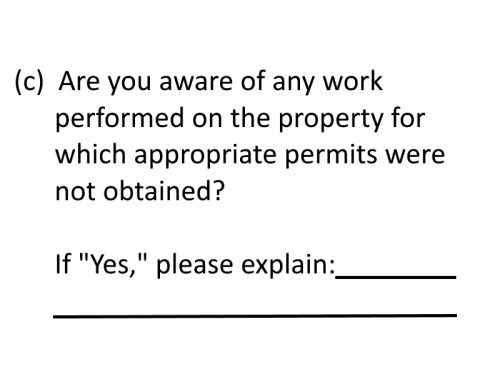Something that seems to universally freak people out when buying a home is learning that work was done to the home without appropriate permits being pulled. I get questions about this topic quite frequently, so here’s my two cents: it’s not the end of the world, it’s usually not a big deal, and in many cases, it won’t make any difference.
The latest question that made me decide to blog about this topic came from someone buying a home with a recently remodeled kitchen. It was all supposed to have been professionally done and the work all looked great, but the buyer was ready to cancel her entire purchase of the home after she discovered no permits had been pulled.
Her reaction, right there, is without a doubt the biggest consequence for not pulling permits. The lack of building permits gets some people very worked up. In many cases, people’s biggest fear when buying is that they’ll have a hard time selling their home in the future. I’m pretty sure that’s called circular reasoning. That’s an area where I have no expertise, so I’ll stay out of it, but I can talk about home performance and quality of workmanship.
Just because a permit wasn’t pulled doesn’t mean the work was done improperly. Conversely, even if permits were obtained, inspected, and approved, it doesn’t mean the work was done properly. It simply means that nobody flagged any problems during the inspection.
I don’t know of any great way to determine if unpermitted work was performed at a property in Minnesota. The seller’s disclosure form has a question that asks “Are you aware of any work performed on the property for which appropriate permits were not obtained”? This box is almost always checked “no”, as you might imagine. This doesn’t mean much.
For starters, I’ve found that most homeowners don’t know what type of work requires a permit. Are you aware you’re supposed to pull an electric permit if you’re replacing a light fixture, and a plumbing permit if you’re replacing a bathroom sink faucet?
Not only do most people not know what work does and does not require a permit, but the question asked on the seller’s property disclosure statement isn’t a great question. It simply asks if the owner was given permission to do work. It doesn’t ask about whether the work was inspected or approved. Obtaining a permit is simply the first step, and should not be considered critical information.
How do permits affect the home inspection?
In short, the presence or absence of building permits doesn’t have a big effect on the home inspection. We inspect everything the same way, whether permits were pulled for the work or not. We may be more suspicious of work that has all been done by a handy DIYer, but we’re always even more suspicious of work at flipped houses, permits or no permits.
If you’re buying a home and discover improvements were made without permits, discuss your concerns with your home inspector, real estate agent, and possibly an attorney specializing in real estate. It’s not a big deal in most cases, but I’ve heard a few horror stories from people who planned to use the home as a rental property.


Tony
August 2, 2016, 10:45 am
Wow, I had no idea. That probably should be a scrolling warning on all those DIY and HGTV channel shows. Permits are seldom mentioned on many of the shows. As usual, great info!
Doug
August 3, 2016, 9:57 am
Permits are most frequently mentioned on “Flip or Flop”, and usually because the host failed to get them.